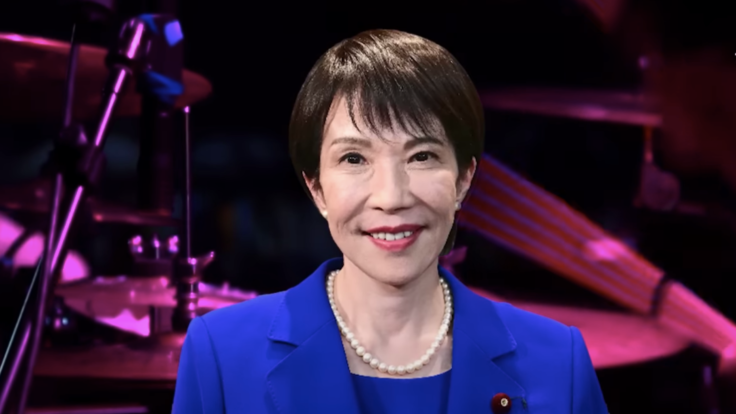Sanae Takaichi Baffles Japan: How a Heavy Metal Drummer Became Prime Minister

Sanae Takaichi has become Japan's first female prime minister after her election by the lower house of the Liberal Democratic Party (LDP) and a delicate coalition pact.
Her victory ended decades of male leadership in Tokyo and signalled a significant shift in Japan's ruling party by reshaping the country's conservative political landscape.
According to The Associated Press, Takaichi, 63, was elected by Japan's parliament on 21 October 2025, receiving 237 votes in the 465-seat lower house to succeed outgoing Prime Minister Fumio Kishida.
Her victory followed a tense leadership race inside the ruling LDP, where she narrowly defeated digital minister Taro Kono.
From Heavy-Metal Drums To Prime Minister's Office
Before entering politics, Takaichi made waves in a different arena--as a heavy-metal drummer during her university years.
She played in an all-female band while studying at Kobe University, an early glimpse of the drive and discipline that would later define her political career, reported Liputan 6.
Born in Nara Prefecture in 1961, Takaichi was raised by a police-officer mother and an auto-industry father.
After graduating, she entered politics in 1993, initially losing her first race but later winning a seat in Japan's House of Representatives.
Her long climb within the LDP culminated in her election as party leader on 4 October, paving the way to the top job, according to Business Standard.
Coalition Maneuvers and Political Strategy
Takaichi's rise to power was shaped by deft coalition-building. The LDP's longtime partner Komeito ended its 26-year alliance earlier this month, plunging the ruling bloc into crisis.
But Takaichi quickly forged a new partnership with the Japan Innovation Party (Ishin), which backed her premiership and gave her the votes she needed to win, according to Al Jazeera.
Despite this, her government remains a minority coalition, and she will have to seek broader support to push legislation through the Diet, reported Reuters.
Conservative Roots and Nationalist Vision
A protégé of the late Shinzo Abe, Takaichi has built her reputation as a staunch conservative and admirer of former UK prime minister Margaret Thatcher.
Her policies echo Abe's 'Abenomics' model, which advocated tax cuts and state-led economic stimulus and called for Japan to revise its pacifist constitution to expand military capabilities.
According to Channel News Asia, she is expected to increase defence spending and take a firmer stance toward China and North Korea.
The Washington Post noted that she will likely prioritise regional security and deepen ties with the United States.
However, her traditionalist social views--opposing same-sex marriage and separate surnames for married couples--have drawn criticism even from progressive women's groups, according to Business Standard.
Breaking Japan's Political Glass Ceiling
Takaichi's victory is historic in a country where women hold only 10 percent of parliamentary seats. Japan consistently ranks low on the World Economic Forum's Global Gender Gap Index.
Analysts told Time Magazine that her election is both symbolically powerful and politically complex—a breakthrough that may not automatically lead to feminist reforms.
Her leadership style will determine whether she truly changes Japan's gender landscape or simply becomes a conservative symbol of female success.
Challenges Ahead for Japan's First Female Premier
Takaichi inherits an economy weighed down by stagnation, ageing demographics, and inflationary pressure. As noted by Reuters, her immediate challenge will be to push her fiscal-stimulus agenda through a divided parliament.
According to The Washington Post, she faces early tests in diplomacy, including managing relations with China and hosting US President Donald Trump, who is expected to visit Tokyo later this year.
From Rhythm to Leadership
Takaichi's personal journey—from pounding drums in smoky live-house clubs to commanding Japan's National Diet—has captured the public imagination.
For many, her ascent mirrors the balance Japan must strike between individuality and tradition, modernity and conservatism.
Whether her leadership ushers in a fresh rhythm for Japan or plays a familiar tune will define her legacy in the years ahead.
Legacy Ambitions Under A Fragile Mandate
Takaichi's personal journey from conservative female politician to Japan's first woman prime minister captures both change and continuity. She must now convert symbolism into action. With a minority coalition, the test of her leadership will not just be precedent-setting — it will be results-driven.
Failure to win support in the Diet or to deliver on core policy promises could shorten her tenure. Japan's next chapter begins under a woman's leadership, but the real question is how long the script holds.
© Copyright IBTimes 2025. All rights reserved.





















